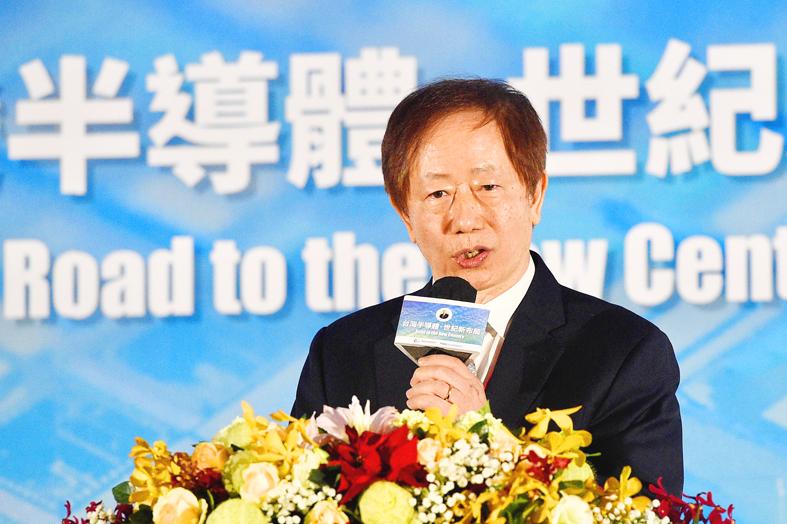If China invades Taiwan there would be no winners and everyone would lose, and people should draw lessons from the Russia-Ukraine war, which is not good for either side, Taiwan Semiconductor Manufacturing Co (TSMC, 台積電) chairman Mark Liu (劉德音) told CNN.
The interview on the Fareed Zakaria GPS program on Sunday came at a time of heightened cross-strait tensions amid a potential visit to Taiwan by US House of Representatives Speaker Nancy Pelosi.
“People in Taiwan have earned their democratic system and they want to choose their way of life,” Liu said in the interview. “Indeed, chip supply is a critical business in Taiwan, but had there been a war in Taiwan, probably the chip is not the most important thing we should worry about, because this invasion is destruction of the world rules-based order. The geopolitical landscape would totally change.”

Photo: George Tsorng, Taipei Times
Liu said the Russia-Ukraine war is not good for either side and it is a lose-lose-lose scenario for the Western world, Russia and Ukraine.
People should draw lessons from the war in Ukraine, and look at Taiwan and decide how to avoid a war, and how to ensure the engine of the world economy continues humming, he said.
Asked by Zakaria what Taiwan would look like in the future, Liu said that he hopes Taiwan does not get discriminated against because it is close to China.
“No matter your relation with China, Taiwan is Taiwan,” Liu said. “We want to unleash the innovation for the world into the future continuously and not to be scared because we have some disputes with our neighbors.”
Zakaria asked Liu whether Taiwan being so integral to the Chinese supply chain creates a danger for Taiwan or serves as a deterrent since Beijing says that it needs to have total control of this valuable asset.
Liu said that China accounts for about 10 percent of TSMC’s business and that it only supplies the consumer market rather than the military or other markets.
“If they [China] need us, it is not a bad thing,” he said.
However, he warned that a military invasion by China would make TSMC factories inoperable and that it would also hurt China.
“Because our interruption would create great economic turmoil in China — suddenly their most advanced component supply disappears. It is an interruption, I must say, so people will think twice on this,” Liu said. “Nobody can control TSMC by force ... because it is a sophisticated manufacturing facility that depends on the real-time connection with the outside world,” such as Europe, the US and Japan for materials, chemicals and engineering software.
Minister of Economic Affairs Wang Mei-hua (王美花) yesterday told reporters that Liu’s comments were correct because if China were to invade, Taiwan’s semiconductors would not be available to the world and that would cause serious economic problems.
“That is why we say if something happens to Taiwan, the world would suffer the consequences,” Wang said.

Right-wing political scientist Laura Fernandez on Sunday won Costa Rica’s presidential election by a landslide, after promising to crack down on rising violence linked to the cocaine trade. Fernandez’s nearest rival, economist Alvaro Ramos, conceded defeat as results showed the ruling party far exceeding the threshold of 40 percent needed to avoid a runoff. With 94 percent of polling stations counted, the political heir of outgoing Costa Rican President Rodrigo Chaves had captured 48.3 percent of the vote compared with Ramos’ 33.4 percent, the Supreme Electoral Tribunal said. As soon as the first results were announced, members of Fernandez’s Sovereign People’s Party

EMERGING FIELDS: The Chinese president said that the two countries would explore cooperation in green technology, the digital economy and artificial intelligence Chinese President Xi Jinping (習近平) yesterday called for an “equal and orderly multipolar world” in the face of “unilateral bullying,” in an apparent jab at the US. Xi was speaking during talks in Beijing with Uruguayan President Yamandu Orsi, the first South American leader to visit China since US special forces captured then-Venezuelan president Nicolas Maduro last month — an operation that Beijing condemned as a violation of sovereignty. Orsi follows a slew of leaders to have visited China seeking to boost ties with the world’s second-largest economy to hedge against US President Donald Trump’s increasingly unpredictable administration. “The international situation is fraught

MORE RESPONSIBILITY: Draftees would be expected to fight alongside professional soldiers, likely requiring the transformation of some training brigades into combat units The armed forces are to start incorporating new conscripts into combined arms brigades this year to enhance combat readiness, the Executive Yuan’s latest policy report said. The new policy would affect Taiwanese men entering the military for their compulsory service, which was extended to one year under reforms by then-president Tsai Ing-wen (蔡英文) in 2022. The conscripts would be trained to operate machine guns, uncrewed aerial vehicles, anti-tank guided missile launchers and Stinger air defense systems, the report said, adding that the basic training would be lengthened to eight weeks. After basic training, conscripts would be sorted into infantry battalions that would take

GROWING AMBITIONS: The scale and tempo of the operations show that the Strait has become the core theater for China to expand its security interests, the report said Chinese military aircraft incursions around Taiwan have surged nearly 15-fold over the past five years, according to a report released yesterday by the Democratic Progressive Party’s (DPP) Department of China Affairs. Sorties in the Taiwan Strait were previously irregular, totaling 380 in 2020, but have since evolved into routine operations, the report showed. “This demonstrates that the Taiwan Strait has become both the starting point and testing ground for Beijing’s expansionist ambitions,” it said. Driven by military expansionism, China is systematically pursuing actions aimed at altering the regional “status quo,” the department said, adding that Taiwan represents the most critical link in China’s